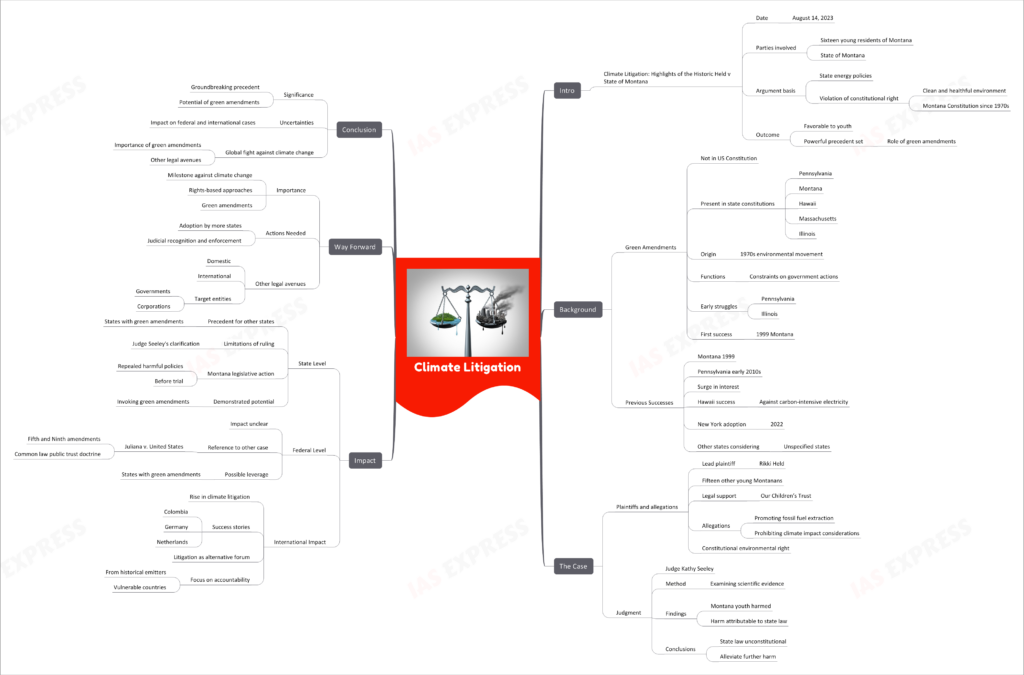Climate Litigation- Highlights of the Historic Held v State of Montana
From Current Affairs Notes for UPSC » Editorials & In-depths » This topic
IAS EXPRESS Vs UPSC Prelims 2024: 85+ questions reflected
In a historic decision on August 14, 2023, sixteen young residents of Montana won a landmark case, Held v State of Montana, against their state over climate change issues. The case was predicated on the argument that state energy policies were in violation of the plaintiffs’ constitutional right to “a clean and healthful environment,” a right that has been part of the Montana Constitution since the 1970s. This ruling, in favor of the youth, sets a powerful precedent for the role of “green amendments” in climate litigation and highlights a new approach to elicit environmental change.

Background
Green Amendments
Although the US Constitution does not contain a green amendment, several state constitutions, including Pennsylvania, Montana, Hawaii, Massachusetts, and Illinois, amended their constitutions during the 1970s environmental movement to recognize the right to a clean and healthful environment. These green amendments act as constraints on government actions. However, early cases in Pennsylvania and Illinois had little success, and it was not until 1999 in Montana that a green amendment was successfully invoked to vindicate the constitutional right to a clean and healthful environment.
Previous Successes
The success in Montana in 1999, followed by another in Pennsylvania in the early 2010s, ignited a surge of interest in green amendments. In Hawaii, public interest groups successfully challenged carbon-intensive electricity generation, leading the state to rely on its green amendment to reject new carbon-intensive electricity sources. In 2022, New York adopted a green amendment, and several other states are considering adopting similar amendments.
The Case
Plaintiffs and Allegations
The lead plaintiff, Rikki Held, along with 15 other young Montanans, backed by the Our Children’s Trust legal team, argued that state laws promoting fossil fuel extraction and prohibiting the consideration of climate impacts during environmental review were in violation of their constitutional environmental right.
Judgment
Judge Kathy Seeley, after examining extensive scientific evidence, concluded that the Montana youth were indeed being harmed by climate change effects in Montana, and these effects could be attributed to the challenged state law. As a result, she declared the state law unconstitutional, as it would alleviate further harm to the youth. This groundbreaking decision suggests that in states with green amendments, state laws cannot prohibit the consideration of greenhouse gas emissions and their climate impact during environmental review.
Impact
State Level
The ruling sets a precedent for other states with green amendments to challenge state laws promoting climate change. However, Judge Seeley clarified that she could not order the state to create a remedial plan for climate change, and the Montana legislature had already repealed the state policies promoting fossil fuel extraction two months before the trial. Nonetheless, the ruling demonstrates that green amendments can be invoked to demand environmental change.
Federal Level
The impact of this decision on federal climate litigation remains unclear. The federal youth climate case, Juliana v. United States, relies on the Fifth and Ninth amendments to the US Constitution and the common law public trust doctrine, which are not considered environmental rights akin to a green amendment. However, climate advocates in states with green amendments will likely leverage the Montana youth case in challenging state laws that promote climate change.
International Impact
Internationally, climate litigation has been on the rise, with successes observed from Colombia to Germany to the Netherlands. These cases often involve citizens and young people challenging their governments for inadequate responses to the climate crisis. The increasing use of climate litigation as an alternative forum to demand accountability and remedies is crucial, especially for individuals from vulnerable countries seeking accountability from historical emitters.
Way Forward
The Held v State of Montana case represents a significant milestone in the fight against climate change. It underscores the importance and potential effectiveness of rights-based approaches and green amendments in tackling environmental issues. Moving forward, it is essential for more states to adopt green amendments and for courts to recognize and enforce these constitutional rights. Additionally, it is crucial to explore other legal avenues, both domestically and internationally, to hold governments and corporations accountable for their contributions to climate change.
Conclusion
The victory of the Montana youths in the Held v State of Montana case sets a groundbreaking precedent for climate litigation and demonstrates the potential of green amendments to elicit environmental change. While the impact of this decision on federal and international climate litigation remains uncertain, it undoubtedly represents a step forward in the global fight against climate change. Ultimately, the case underscores the importance of adopting and enforcing green amendments and exploring other legal avenues to demand accountability and address the climate crisis.
Practice Question for Mains
Can climate litigation solve the issues of accountability and climate action? Discuss. (250 words)
If you like this post, please share your feedback in the comments section below so that we will upload more posts like this.

